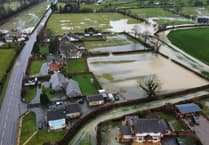Avara Foods, the largest poultry producer in the river Wye catchment, says it has sharply cut the manure from its supply chain that remains in the area.
Manure spread on fields, arising from the 24 million chickens in the area, has been identified as a major cause of pollution in the Wye and its tributaries, harming wildlife.
But Avara’s latest update on its Sustainable Poultry Roadmap says: “Taking into account farm closures and out-of-catchment exports, manure from our supply chain has reduced 30 per cent since the start of 2023.”
The update also confirms the company’s longer-term aim to divert poultry manure “principally into anaerobic digestion [AD] plants” – even though these are “at least two years from completion”.
It acknowledges there is so far “no indication when a planning decision might be reached” on one intended AD unit, presumed to be the Whitwick Manor development near Ledbury on which public consultation closed over seven months ago.
“Avara’s roadmap will solve the problem for Avara and its customers, but without a serious debate on the real causes will make no difference to the river,” its update adds.
But Save The Wye Coalition founder Richard Tyler said the company’s update “is just as thin and insubstantial as the original so-called roadmap issued earlier this year”, with “no evidence, no science, nothing that will give us any reassurance that this is more than greenwash”.
He claimed Avara’s reliance on AD was “fantasy”, adding: “They don’t seem to realise that phosphates do not get digested. Just as much comes out as goes in. And they can create their own pollution.”
Mr Tyler managed to address a question to Tesco, which Avara supplies, during the retailer’s annual general meeting last week (Friday, June 16) on what he claimed was its lack of progress in addressing the impact on the Wye of its intensive poultry and egg production supply chains.
“They may appreciate the urgency but Tesco is promising nothing new,” he said afterwards. “The Wye needs the leadership that Tesco could bring to help resolve these complex issues.”
Tesco has said it funds work with its suppliers to tackle water pollution in the area and bring in best farm practice.





Comments
This article has no comments yet. Be the first to leave a comment.